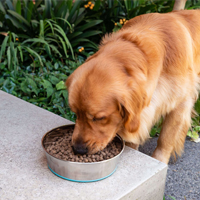
Milk Thistle for Dogs and How to Safely Use It
One of the most beneficial of all the herbs for your senior dog is milk thistle. Called Silybum marianum or blessed milk thistle for dogs or Mary thistle or Scotch thistle or any variety of things, this annual or biennial plant is found throughout the world and has been researched for several medicinal applications.
It is also used in traditional Chinese medicine to clear toxins and to soothe the liver, plus it’s a favorite in dubious internet circles for its apparent ability to “slow cancer.
”
Using Milk Thistle for Dogs
The safety of milk thistle is worth mentioning because it underlines how good an option this herb can be for your older dog. Apart from cost and time, there’s no associated risk with using milk thistle. You can initiate a “try it out” approach to this treatment option, but other possibilities such as marshmallow root should also be considered if milk thistle isn’t effective.
In terms of milk thistle for dogs, we do know that the flavonoid silymarin is the important piece of the puzzle because Silymarin releases toxins that can gather in the liver and assist in cell regeneration, which suggests that it can also help boost your pet’s immune system.
Using it on a healthy dog is not recommended, as there are no discernible supplementary benefits to speak of though.
- The most common application for milk thistle powder dosage with regards to dogs, seems to be in the world of liver disease, which is more common in canines than you might think. The silymarin helps release toxins in the liver and prevents oxidation, which is the increase of free radicals in the body. Because of its function as testosterone cypionate vs enanthate an antioxidant, many pet parents wear by milk thistle as a supplement for treating their dog’s liver disease.
- Some pet owners have turned to milk thistle to treat what’s known as medication-induced liver damage. If your pet has been taking medications for a long period, it’s possible that long-term damage could result.buy wellbutrin online www.thesupplementreviews.org/wp-content/uploads/2022/10/png/wellbutrin.html no prescription pharmacy
Milk thistle supplements can help repair organ damage and can flush out residual chemicals left behind by extensive medicinal regimens.
- There are a number of reports online about the use of milk thistle in dogs with inflammatory bowel disease, although most of the evidence is anecdotal. Due to IBD’s tendency to attack and inflame the liver and bile system in the pancreas, milk thistle powder dosage can help alleviate symptoms by flushing toxins and reducing inflammation. This suggests a usage in dogs with pancreatitis as well.
- Milk thistle can be used to support the immune system. Because it scavenges for free radicals and works as a powerful antioxidant, milk thistle has been popularized to help stave off the effects of aging as well. Its capacity for preserving the antioxidant glutathione has made it a popular choice for those dog parents with aging family members.
Dosage for Dogs
Most milk thistle supplements contain anywhere from 50-500 milligrams. 175mg seems to be the norm for
Advanced Liver Disease: Use up to 200mg per 10 lbs of body weight of milk thistle extract a day. If using for other health issues where your dog isn’t suffering from a serious illness; a good rule of thumb is to stick with 1/3 to 1/2 of this dose instead.
Preventative Measures
As mentioned, blessed milk thistle is a very safe treatment option for your dog. There are no known side effects other than mild stomach upset and diarrhea, indigestion, intestinal gas, bloating, fullness or pain and loss of appetite.
Drug interactions: According to Dr.Weil.com, the liver enzymes that break down milk thistle may interfere with the process of drugs that are metabolized by those exact enzymes. Can lead to hypoglycemia when combined with medications for diabetics such as Amaryl. This also includes the allergy medicine fexodenadine (Allegra); cholesterol lowering drugs; anti-anxiety drugs including Xanax, Valium and Ativan; blood thinning medications including Coumadin and some cancer maedications such as Tamoxifen.
References: Herbs for Pets by M.L. Wulff-Tilford and G.L. Tilford, Natural Remedies for Dogs and Cats by CJ Puotinen










